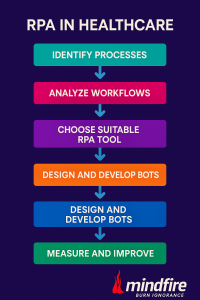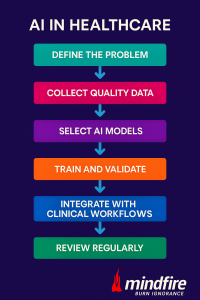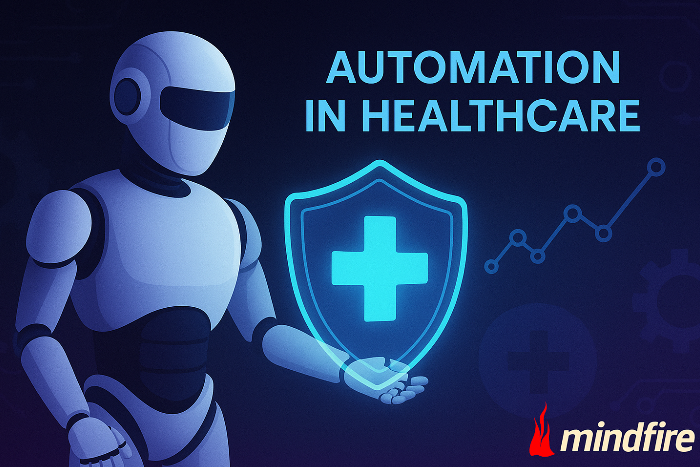The healthcare industry is constantly striving to improve efficiency, accuracy, and patient care. While dedicated medical professionals are the heart of any hospital, Information Technology (IT) offers a powerful tool to revolutionize day-to-day operations through automation. By leveraging automation technologies like Robotic Process Automation (RPA) and Artificial Intelligence (AI), hospitals can streamline workflows, reduce errors, and empower staff to focus on what matters most: their patients.
What is Healthcare Automation?
Healthcare automation uses technology to streamline, simplify, and enhance various medical and administrative processes within the healthcare industry. From patient scheduling and medical billing to diagnostics and remote monitoring, automation in healthcare is transforming how care is delivered by reducing manual effort, minimizing errors, and improving operational efficiency. By integrating tools like artificial intelligence, robotic process automation (RPA), and electronic health records (EHRs), healthcare providers can focus more on patient care while ensuring faster, more accurate services across the board.
Benefits of Automation in Healthcare Industry
Imagine a hospital where appointment scheduling happens seamlessly, tireless virtual assistants handle repetitive tasks, and doctors have instant access to accurate patient data. This is the future of healthcare powered by automation.
Hospitals are plagued by a multitude of time-consuming, repetitive tasks that drain valuable resources. These administrative burdens distract staff from delivering optimal patient care, from data entry and billing to report generation and scheduling. Furthermore, manual processes are prone to human error, which can have serious consequences in a healthcare setting.
Streamlining Workflows and Boosting Efficiency
Streamlining workflows and automating operations can transform healthcare institutions in various ways. Here are some key areas where IT can automate daily operations:
- Patient Intake and Scheduling:
- Manual appointment scheduling can be a logistical nightmare.
- Automation software can streamline the process, allowing patients to book appointments online, receive automated reminders, and manage cancellations efficiently.
- This frees up staff time and reduces wait times, improving the overall patient experience.
- Revenue Cycle Management (RCM):
- RPA can be a game-changer for RCM.
- Automating tasks like pre-claim checks, claim status reporting, and account receivable follow-ups significantly reduces errors and streamlines billing processes.
- This translates to faster reimbursements and improved cash flow for the hospital.
- Clinical Workflow Automation:
- From inventory management to medication dispensing, automation can handle various repetitive tasks within the clinical setting.
- This frees up nurses and doctors to focus on patient interaction and reduces the risk of burnout caused by administrative overload.
- Data Management and Analysis:
- Hospitals generate vast amounts of data from patient records, billing systems, and medical equipment.
- Automation tools can collect, organize, and analyze this data, providing valuable insights to improve patient care, resource allocation, and overall hospital operations.
The Human Touch of Automation in Healthcare
While automation excels at streamlining workflows, it doesn’t replace the human element in healthcare. Automation empowers staff to focus on what they can do best: offer compassionate and effective care to patients. Here’s how:
- Improved Accuracy and Reduced Errors: Automation minimizes human error in tasks like data entry and medication dispensing, leading to safer and more effective patient care.
- Faster Diagnosis and Treatment: AI-powered tools can analyze patient data and medical images, aiding doctors in faster and more accurate diagnoses. This allows for earlier intervention and improved patient outcomes.
- Enhanced Communication and Patient Engagement: Chatbots and virtual assistants can answer patient questions, schedule appointments, and provide basic medical information. This frees up staff time for more complex interactions and improves patient satisfaction.
Building a Culture of Automation
While the potential benefits of automation in healthcare are clear, successful implementation requires careful planning and consideration. Here are some key factors to address:
- Identifying the Right Tasks: Not all tasks are suitable for automation. Hospitals should prioritize tasks that are repetitive, rule-based, and high-volume.
- Staff Training and Support: Change management is crucial. Staff need to understand how automation complements their roles and empowers them to provide better care. Training on using new automated systems is essential for seamless adoption.
- Data Security and Privacy: Protecting patient data is paramount. Hospitals must ensure that automated systems comply with data privacy regulations and implement robust security measures.
- Integration with Existing Systems: For smooth operation, automated systems need to integrate seamlessly with the existing hospital IT infrastructure.
Examples of Automation in Healthcare
- Appointment Scheduling
Automated systems let patients book, reschedule, or cancel appointments online. This saves time and reduces administrative workload. - Healthcare Claims Processing
Automation tools handle claim submissions, track statuses, and flag errors before submission. This speeds up reimbursements and reduces claim denials.
Explore how Mindfire developed a robust solution using RPA to streamline healthcare claims processing and improve operational efficiency. - Electronic Health Records (EHRs)
EHR systems update patient information automatically and share it across departments. This improves data accuracy and care coordination. - Remote Patient Monitoring
Devices like wearables track health metrics and send real-time updates to providers. This helps detect issues early and reduces unnecessary hospital visits.
Discover how Mindfire engineered a scalable Patient Monitoring System to support real-time data tracking and proactive care. - Chatbots for Patient Support
AI chatbots respond to common patient queries, send reminders, and assist with basic triage. They improve accessibility and lighten the load on support staff.
How to Use Automation in Healthcare?
Healthcare organizations are turning to automation to improve accuracy, reduce manual work, and deliver faster services. Two major technologies driving this shift are RPA and AI. Each serves a different purpose but works toward the same goal—better care with greater efficiency.
Implementing RPA in Healthcare
RPA in healthcare automates repetitive, rules-based tasks that don’t require human judgment. It’s widely used to streamline operations like billing, claims processing, and appointment scheduling. Here’s how to implement it effectively:

- Identify repetitive tasks
Start with tasks like claims processing, appointment scheduling, or data entry. - Assess the process
Map each step clearly. Ensure it’s rule-based and has minimal variation. - Choose an RPA tool
Select a platform like UiPath, Automation Anywhere, or Blue Prism. - Build bots
Use the RPA tool to create bots that perform the task. Test them on small workloads first. - Integrate with existing systems
Make sure bots can access EHRs, billing systems, or other software. - Monitor and optimize
Track performance. Update bots if workflows change or new rules are introduced.
Struggling with complex workflows or limited tech expertise? Mindfire’s Custom RPA Solutions help healthcare providers automate with ease—tailored to your systems, your pace, and your goals.
Implementing AI in Healthcare
AI for healthcare uses data to enhance clinical decisions, automate complex analysis, and improve patient outcomes. According to the Financial Times, hospitals worldwide are adopting advanced technologies to achieve “smart hospital” status, aiming to improve patient care and operational efficiency. For instance, the Cleveland Clinic employs AI to predict sepsis risks, while Nottingham University Hospitals uses voice-controlled patient systems. The smart hospital market, incorporating AI, IoT, and robotics, is projected to grow to $148 billion by 2029. AI is valuable in diagnostics, personalized treatment plans, and predictive analytics. Here’s how to apply it:

- Define the problem
Choose areas like diagnostics, imaging analysis, or patient risk prediction. - Collect quality data
Use historical patient data, medical records, and clinical notes. Clean and structure it properly. - Select AI models
Pick models based on your goal: classification, prediction, or pattern recognition. - Train and validate
Train the model on labeled data. Validate accuracy using a separate dataset. - Integrate with clinical workflows
Ensure AI results are easy for doctors to interpret and act on. Embed insights in dashboards or EHRs. - Review regularly
Monitor results. Update models as more data becomes available or guidelines change.
Looking to implement AI in your healthcare operations but don’t know where to start? Mindfire’s AI Development Services deliver custom solutions that help providers improve patient outcomes and optimize workflows.
The Future of Healthcare Automation
The benefits of automation in healthcare are undeniable. From streamlined workflows and improved patient experiences to reduced errors and empowered staff, IT solutions hold the key to revolutionizing the industry. By embracing automation, hospitals can create a more efficient, sustainable, and ultimately, patient-centered environment.
The path forward requires a strategic approach. Identifying the right tasks for automation, providing staff training and support, and prioritizing data security are crucial steps. However, the rewards are substantial. With a commitment to innovation and a focus on human-machine collaboration, hospitals can leverage the power of automation to write the next chapter in quality healthcare delivery.
Looking to automate healthcare operations with precision and speed? Our Healthcare Software Development Services deliver custom solutions that streamline workflows, enhance accuracy, and support smarter decision-making.
